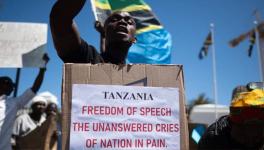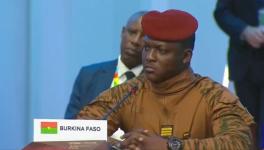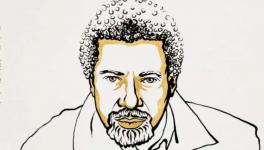Nobel Laureate Abdulrazak Gurnah on Exile and Literature
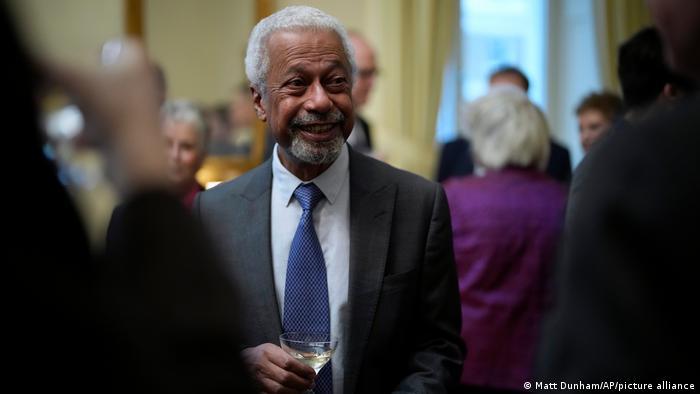
Tanzanian-born writer Abdulrazak Gurnah at the ceremony for the Nobel Prize for Literature in 2021
Born in 1948 in Zanzibar in Tanzania, Abdulrazak Gurnah's roundabout life journey is reflected in his novels, in stories full of longing, poetry and the desire for change that range between countries, continents and identities.
His semi-autobiographical novels recount Tanzania's struggle for independence, the rise of Tanzanian President Julius Nyerere, a socialist, and Zanzibar's first president, Abeid Karume, who targeted the Arab-descended population of the former Sultanate.
Gurnah is of Arab ancestry and fled into exile in England in 1968 before earning a degree from the University of London. Most recently, he taught English and postcolonial literature at the University of Kent.
Meanwhile, Abdulrazak Gurnah's 10 novels have made him one of Africa's most celebrated writers, and earned him the Nobel Prize for Literature in 2021. He was honored "for his uncompromising and compassionate penetration of the effects of colonialism and the fate of the refugee in the gulf between cultures and continents."
DW spoke to the author about history, identity, African writers and his own literary journey.
DW: At the beginning of your 2001 novel, "By the Sea," we meet protagonist Saleh Omar at Gatwick Airport as he seeks refuge in Great Britain. You did the same over 50 years ago. What did you experience back then?
Abdulrazak Gurnah: I was an 18-year-old young man leaving Zanzibar, in the state that Zanzibar was in '67: It was a terrifying place for a lot of people. Our government, our authorities were still on a punitive rage of all kinds against the whole population. Many people were driven away by circumstances because their parents were persecuted or imprisoned, or in some cases killed, but also sometimes simply because they frightened everybody.
I think when you're young, you think: "I'm not putting up with this. I can do better than this. I don't want to be stuck here with these bullies." It's sort of in that spirit.
But what you don't know in those situations is what it is that you're kind of giving up ... that you're leaving behind. So going to England was like an adventure in some ways, but it was also a great loss.
You have been living in Great Britain for five decades now. Do you feel like you are a British or an African author?
Well, I know my identity, which is that I am a man from Zanzibar who lives in the UK and I write. This is my identity. I don't say, I'm an African writer or I'm a British writer or whatever. I'm from Zanzibar and I live in the UK. I'm from both of these places in any possible way you can think of.
And whoever wants to find a more refined expression or description, it's fine. If identity is a way of reducing a person's being to something simplified, I'm not interested, but I don't want to deny anybody the pleasure of doing so.
Why did you decide to write in English?
Well, for a start, the simple answer is simply because I wanted to. But in a more complicated way, it's a language which, just by chance, I learned and felt very comfortable in. Swahili was given to me because of the way I was brought up and I am very grateful for that.
When it came to writing, I didn't really think about what language I wanted to write in. I kind of understood and knew that I had an intimate connection and relationship with the way I used English that I didn't quite have in writing Swahili. People who are writing in Swahili do things with a language that I don't know how to do.
These are not always choices. People do not choose to be writers. It's not just a matter of putting words together. It's a matter of having a real kind of connection and intimate feel for language that, it seems to me, is what makes writing. And I had that and I was grateful for it.
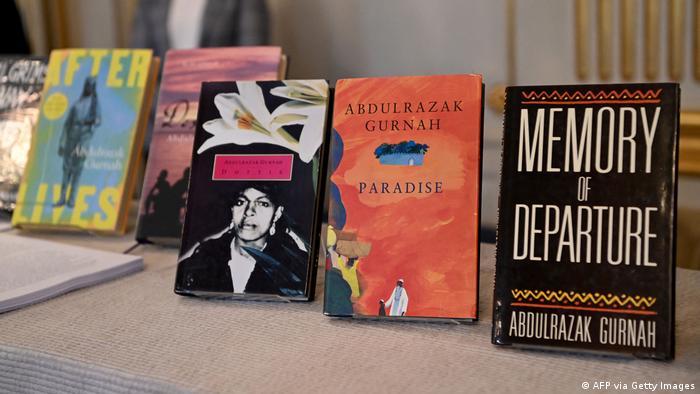
Some of Gurnah's 10 novels
In 2021, important literary prizes went to authors from sub-Saharan Africa. You received the Nobel Prize for Literature, while Mohamed Mbougar Sarr, was awarded the Prix Goncourt. Is the world now more receptive to African writers?
I think the reason these prizes have been awarded to these materials is because of the quality of the writing. And that's why I'm saying it's a coincidence. It's not [that] the world is waking up now.
African authors were denied the ability to create works of literary value during the colonial era. Yet literature, or writing in general, is integral to the struggle for decolonization. Could you give some examples of this?
You can point to many examples of that: Many people during the decolonizing period in Africa referred to examples of Gandhi, or maybe it might be even civil rights leaders like Martin Luther King or South African writers like Nelson Mandela.
And so, it is writing and the capacity of that to disseminate beyond its borders that then reaches people who are also in similar circumstances who are enlightened, illuminated, inspired by that, and see that as an example of what they might do.
Edited by: Elizabeth Grenier
Get the latest reports & analysis with people's perspective on Protests, movements & deep analytical videos, discussions of the current affairs in your Telegram app. Subscribe to NewsClick's Telegram channel & get Real-Time updates on stories, as they get published on our website.









